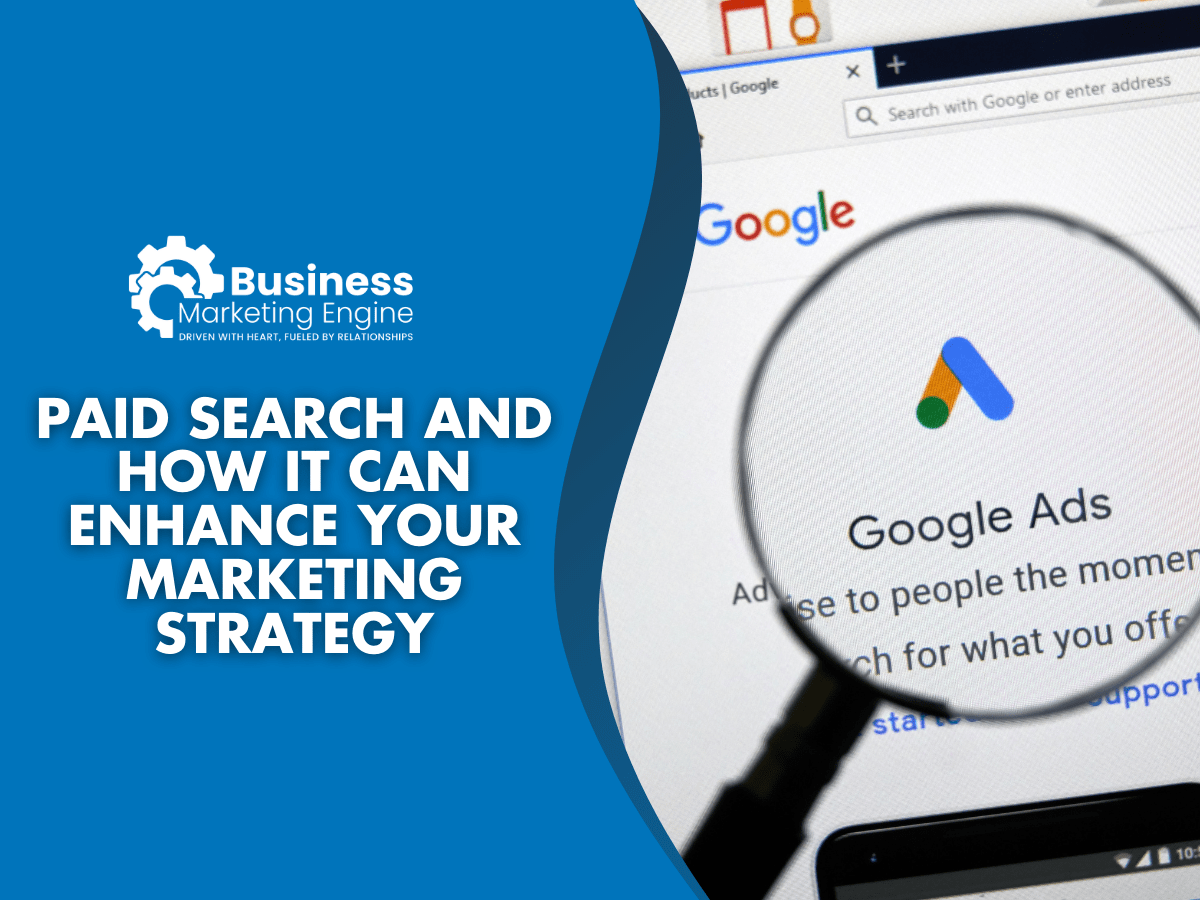Looking for an inexpensive way to showcase your brand and connect your target audience with your company website?
Paid search is a form of online advertising where you can pay to have your brand adverts show up as a sponsored result on search engine pages like Google.
It’s an effective way to get in front of users who are actively searching for what you offer, and it can be a cost-effective way to drive traffic to your website.
There are many aspects of paid search to consider when setting up and managing paid search campaigns.
These include choosing the right keywords, creating targeted ad copy and landing pages, monitoring performance to optimize results and adjusting campaign settings to achieve your desired goals.
In this article, we’ll dig a bit deeper into each of these paid search components and discuss strategies for optimizing paid search campaigns.
What is Paid Search?
Paid search, also known as paid search marketing or paid listings, is a form of online advertising that allows businesses to display their ads in response to specific keyword queries on search engines and other digital platforms.
By bidding on relevant keywords and targeting your ads to highly-searched terms, paid search allows you to get your message in front of potential customers who are already searching for products or services like yours.
You can hire a marketing agency that is willing to manage your paid search campaigns on your behalf, or you can set up and do paid search management yourself using a paid search platform like Google AdWords or Bing Ads.
At Business Marketing Engine, we offer paid search services that can help you achieve better results from your paid search campaigns.
Contact us today to get started!
How Does Paid Search Marketing Work?
Paid search marketing is a powerful tool that allows businesses to target specific keywords and reach potential customers who are actively searching for information related to their products or services.
With paid search, businesses can bid on relevant keywords and display ads in the paid search results sections of search engines like Google and Bing.
Paid Searches
There are two types of paid search, LSA and PPC.
- LSA (Local Service Ads): Google My Business verifies businesses and allows customers to book appointments directly through the listing. This is so customers can be sure they’re booking with a legitimate, verified company.
- PPC (Pay-Per-Click): Advertisers pay a fee every time their ad is clicked. The most common type of paid search is Google Ads. PPC advertising is more flexible than LSA, as it allows you to customize your PPC campaign to target specific audiences and demographics.
Organic Searches
Organic searches, also known as natural or unpaid search results, are those that appear in the main area of a search engine’s results page.
These are typically determined by algorithms that take into account various factors, such as keyword usage and backlinking, to generate the most relevant results for any given search query.
Compared to paid search results, which are paid advertisements that appear on top of organic results or alongside them on the same page, organic searches have several advantages.
They are seen as more trustworthy by users since they aren’t paid for and can often be more specific than paid results. Additionally, they usually appear earlier in the search results list than paid ads, making them a great way for businesses to drive more traffic to their websites.
Ad Rankings in Paid Searches
Ad rankings in paid searches are determined by several factors, including the quality of the ad, the relevance of the keywords used, and the bid amount.
The higher the quality of the ad and the more relevant the keywords, the higher the ranking will be.
The bid amount also plays a role in determining ad rank; however, it is not the only factor. Quality score is a measure of how relevant and useful your ad is to users, and takes into account things like click-through rate (CTR) and relevancy of your keywords.
If you have a high-quality score, you’ll usually be able to get by with a lower bid amount than if you have a low-quality score.
To see where your ad ranks, calculate your ad quality score using this formula:
Maximum Bid x Quality Score = Ad Ranking
Then compare it to the scores of other ads. The ad with the highest quality score will rank first. If two ads have the same quality score, the ad with the higher bid amount will rank higher.
How to Optimize Your Paid Search
Before diving into paid search, it’s important that you know how to optimize your processes to get the most desirable results. Here are some tips to get you started.
 Keyword Research is the Key
Keyword Research is the Key
Keyword research helps you understand what people are searching for so you can bid on relevant keywords and improve your ad ranking. You can use keyword data to create targeted ad groups and improve your overall campaign performance.
Make sure that you use keywords that your target audience is likely to look for when they search online.
This means doing extensive keyword research to find the words and phrases that best match what your customers would be looking for, whether it’s on search engines like Google or social media sites like Facebook.
Use Negative Keywords Wisely
One of the first things beginners in paid search are always concerned about is maximizing their budget and getting the most for every dollar.
This usually means a lot of focus on testing keywords and trying to drive clicks as cheaply as possible. While this is certainly important (especially in the long run), it can also result in good, but not great performance if you’re not targeting traffic that’s likely to convert.
One simple way to improve your results without costing more money is by using negative keywords. Negative keywords are those that you don’t want showing up in your ads or reporting metrics, so when someone searches for something like “buy cheap shoes online,” your ad won’t show.
By using negative keywords, you can make sure that the only people who see your ads are those who are likely to convert, and you can also get rid of certain traffic that’s unlikely to convert.
Be Specific with Key Terms
When it comes to optimizing your paid search campaigns, being specific with your key terms is essential.
Broad match keywords may get you a lot of traffic, but they may not be the most relevant or targeted traffic. By being more specific with your keywords, you can ensure that the traffic you’re getting is more likely to convert.
For example, if you’re a dentist in Dallas, Texas, and you want to get more patients from your search ads who are looking for an implant dentist, instead of using a broad match keyword like “dental implants,” try going with a phrase like “best dental implants in Dallas.”
Not only will this be more relevant to potential patients who see your ad, but you’ll also be less likely to get clicks from people who are just looking for general information about dental implants and not necessarily interested in getting them done.
Be Relevant and Consistent
As a marketer, it’s important to be relevant and consistent in your paid search campaigns.
This means creating ads that are targeted to the right audience and using the same keywords and messaging across all your ads. By doing this, you’ll be able to optimize your campaigns for maximum results.
To be more relevant and consistent in your paid search campaigns, try using the same keywords and messaging across all of your ads. This way, you can ensure that your ads are reaching the right people and that they’re able to understand your message.
Benefits of Utilizing Paid Search Marketing
As I’m sure you’ve gathered by now, there are quite a few benefits to paid search marketing. Here are a few of the most notable ones:
Visibility Online
Paid search is one of the most effective ways to get your business in front of potential customers who are looking for what you have to offer.
With paid search, you can target your ads to appear in search results for specific keywords that relate to your products and services.
And you don’t have to worry about your ads losing their visibility when someone scrolls down past them on a search results page.
Paid search advertising helps capture users’ attention as they scroll through the results – meaning more people will see your ad than if it were just another organic result in the list.
 Drives Traffic
Drives Traffic
As you can assume, paid search is great for driving traffic to your website. This is because when users are actively searching for something on the internet, they are more likely to click on a sponsored result than an organic one.
Paid search results are also more likely to be clicked on if they are placed at the top of the search engine results page (SERP).
Ability to Reach Targeted Audience
Paid search ads are a great way to target people who are looking for the products and services that you offer.
With paid search and hyper-specific keywords, your ads can show up at the top of relevant Google searches, allowing you to reach potential customers when they’re most likely searching for what you have to offer.
Measurable Data and Analytics
Paid search is a great way to measure your marketing data and analytics. It can be optimized and adjusted accordingly based on the results of your conversions, leads and ROI.
Additionally, you’ll be able to see which keywords are working for you and which ones aren’t by looking at your account’s search engine optimization (SEO) advertising report.
Retargeting Audience
Paid search is a great tool for retargeting your audience. By targeting your ads to people who have visited your site before, you can stay top of mind and increase the chances that they’ll come back and convert.
Plus, paid search is highly targeted, so you can be sure that your ads are reaching the right people. And, if you’re not happy with the results, you can always adjust your campaigns to get better results.
Paid search is a great way to get your business in front of potential customers who are already looking for what you have to offer. It can be a very cost-effective marketing strategy, and it offers a lot of flexibility in terms of how you target your audience.
If you’re interested in learning more about how our customized marketing strategy can benefit your business, contact us at Business Marketing Engine today!


 Keyword Research is the Key
Keyword Research is the Key Drives Traffic
Drives Traffic

